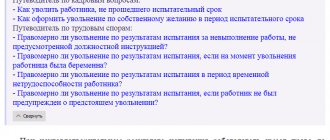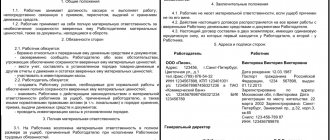Grounds for dismissal
The Labor Code of the Russian Federation formulates the grounds for dismissal as follows: “appearing at work in a state of alcohol, drug or other toxic intoxication.” Dismissal for alcohol intoxication under the article of the Labor Code of the Russian Federation is possible if:
- the employee appeared in a state of intoxication during working hours;
- the employee’s actions contain signs of guilty behavior in the form of intent and negligence.
You cannot be fired if a drunk employee appears at the workplace:
- before the start or end of the working day;
- on weekends or non-working holidays;
- while on regular leave;
- as a result of accidental exposure to adverse production factors or medications.
IMPORTANT!
When dismissing minors under clause 6 of Art. 81 of the Labor Code requires the consent of trade unions, the state labor inspectorate and the commission for minors (Article 269 of the Labor Code of the Russian Federation).
According to the article, a pregnant woman cannot be fired for going to work while drunk. The contract is terminated only in the event of liquidation of the organization (Article 261 of the Labor Code of the Russian Federation).
If an employee is fired for drunkenness without being examined, the decision is often challenged in court. Medical examination is recommended subsection. "b" clause 6 of Art. 81 of the Labor Code as a stage in the procedure for terminating an employment contract.
Step-by-step instructions for dismissal for alcohol intoxication will help you avoid litigation. Properly executed documents will not allow the employee to challenge the administration’s decision.
Dismissal for drunkenness in the workplace: step-by-step instructions
Since dismissal for drunkenness under Article 81 of the Labor Code of the Russian Federation is an entire procedure regulated by the provisions of the law, for it to be carried out correctly, it is necessary to follow the algorithm of actions provided by the legislator. If any part of the procedure is ignored, the court may declare the dismissal illegal.
An employee can be fired for drunkenness in the following order:
- Detection of an employee showing up at work drunk. This can be done by any employee or third parties (for example, clients of a commercial organization) who realize that the employee is drunk.
- Recording this fact and drawing up the necessary documents.
- Removal of an employee from performing a job function.
- Presentation of a requirement to provide written explanations. This is an employer's responsibility that cannot be ignored.
- Dismissal. The dismissal procedure consists of drawing up the necessary documents, familiarizing the employee with them, and giving him copies of them.
Next, we will consider the step-by-step procedure for dismissal for drunkenness (each of the stages).
How to record a state of intoxication correctly
Dismissal for drunkenness in the workplace must be formalized in accordance with all the rules. For a biased approach to applying the most severe disciplinary measure, the employer may be held accountable, and the fired person may be reinstated.
You can read about dismissal without explanation here.
In order to correctly qualify a violation, the employer must, during an internal investigation, obtain confirmation of the state of intoxication through a medical examination or other evidence. According to the law, it is impossible to force an employee to undergo a medical examination. If you refuse to undergo an examination, you must draw up an act, which in the future, if the dismissed person goes to court, will become an additional argument in favor of the employer.
Interesting Facts
You need to know that not all employees can be fired for drunkenness or drug use. Some categories of employees have benefits in this matter. In particular, according to Article 269 of the Labor Code, it is possible to dismiss a worker under 18 years of age for such actions only with the consent of the guardianship authority or the Labor Inspectorate. It is possible to fire a pregnant employee, but only if there is evidence of her intoxication and not the use of alcohol-containing medications.
The employer’s actions are only legal if he reasonably states the employee’s condition as drunk, caused at work and not the result of deteriorating health (for example, increased blood pressure, taking medications, etc.). If the requirements of the law are taken into account when conducting an internal investigation, then based on its results the employee may be subject to appropriate punishment. In the event of further proceedings, the court will not be able to convict the employer of illegality of actions and cancel the dismissal order.
When can an official investigation into drunkenness be conducted?
Showing up at work while drunk is considered a gross violation of labor discipline. It is enough to come to work drunk once for this time to be the first and the last. In such cases, the fate of the employee is decided by the manager, since the Labor Code leaves the employer with the right to make the final decision.
The manager chooses the punishment based on the specific situation, the personal characteristics of the offender and the fact whether it was possible to record, as required by the rules, the fact of the violation. If the employer did not have time to document the misconduct for some reason, it is better not to dismiss the employee.
Read about the liquidation of the branch and the dismissal of employees in this article https://otdelkadrov.online/9505-uvolnenie-sotrudnikov-v-svyazi-s-likvidatsiei-predpriyatiya
Internal proceedings need to be started only if the violation occurred at work. This means:
- The violator was located exactly at the workplace (gateway, workshop area, etc.)
- The offender was drunk during working hours. These are the working hours of the employee himself, and not just the entire organization.
- A violation recorded at the workplace on a day of rest, vacation, or sick leave is not considered committed at work.
If it is confirmed that an employee is drunk at work, this should be documented.
What degree of intoxication can cause dismissal?
As soon as an employer notices that a company employee is drunk, he should invite a doctor who will record the state of the offending employee and determine the degree of his intoxication.
However, it is important to remember that the employee must agree to a medical examination voluntarily; he cannot be forced to do so. If he refuses, it is necessary to draw up an act recording this decision of the employee. In addition, the medical examination procedure is paid and must be carried out at the expense of the company administration.
Labor standards also determine that the fact of intoxication of an employee can also be proven by witness testimony. Therefore, in the latter case, it is advisable, in the absence of a physician, to immediately convene a commission and draw up an act of violation.
Attention! In order for an employee to be brought to disciplinary liability for alcohol intoxication, it does not matter how much ppm is in his blood. What is important is the presence of signs of alcohol intoxication, which are revealed through examination. These include redness of the skin of the face, the smell of alcohol on the breath, speech impairment, instability and other signs of a drunk person.
Types of alcohol intoxication
The concept of the type and severity of alcohol intoxication plays an important role. These are quite diverse definitions, and it is very difficult to understand, much less establish clear boundaries within them.
First, let's look at the severity of alcohol intoxication. In total there are 6 categories:
- The employee is sober. No effects of intoxication or blood alcohol levels were detected;
- Mild intoxication. Alcohol consumption was recorded, but it either did not affect motor skills or had only a slight effect. Alcohol content - from 0.5 to 1.5 ppm;
- Moderate intoxication. Signs of intoxication are detected, motor skills and other body functions are impaired, the person has poor self-control. Alcohol content - from 1.6 to 2.5 ppm;
- Severe alcohol intoxication. A person is not aware of his actions, does not control his own body. Alcohol content - from 2.5 to 3 ppm;
- Alcohol poisoning. From 3 to 3.5 ppm. A severe state of intoxication that can be extremely dangerous for humans. Without timely assistance, a person faces alcoholic coma and death;
- State of drug intoxication. It is caused not by alcohol, but by other intoxicating substances. The strength of intoxication varies and does not depend on ppm.
It’s not for nothing that we mentioned absolutely all stages of intoxication in this article. No matter how surprising it may be, at work a person can find himself in any of them, even in the last, critical one. After all, he can either show up for work drunk or drink alcohol at work.
In addition, intoxication can be of two types - intentional and unintentional. Deliberate intoxication speaks for itself - the person drank alcohol and understood perfectly well what he was doing. But unintentional intoxication is a very complex concept. This is the name for two types of intoxication - caused by medications or caused by accident (the person did not know that he was using a substance that could cause intoxication or contained alcohol).
How is the state of intoxication of an employee at work determined?
In total, there are two ways to determine alcohol intoxication, which are possible according to the Labor Code of the Russian Federation - with an examination by doctors or independent determination based on external signs.
First, let's look at the examination without an examination. In simple and understandable language, this is the definition of intoxication “by sight.” If an employee shows signs of intoxication, he may well be held accountable. However, such signs should be obvious to everyone around. Among them:
- Strong odor of alcohol when exhaling;
- Motor impairment;
- Attention disturbance;
- Significant deviations in employee behavior;
- Unmotivated aggression;
- Hand trembling;
- Inappropriate reaction to the environment.
This type of determination of the state of alcoholic intoxication is used everywhere. But at the same time, it has one huge disadvantage - it is impossible to determine its severity, because everyone tolerates intoxication in their own way.
The second type of determination of intoxication is very specific, as it requires the intervention of specialists. A medical examination for alcohol intoxication is a check of an employee by medical personnel, which also includes a blood test. In ordinary enterprises, it is used only if an employee shows up for work in a state of severe intoxication and needs to call an ambulance. But at various hazardous enterprises such an inspection can be carried out directly “on the spot”, since there must be a special medical department for these purposes. Such a test will not only indicate whether a person has been drinking or not, but also with its help it will be possible to determine the degree of intoxication.
With drug intoxication, everything is much more complicated. Since it may have a variety of characteristic features, and some consequences may not be noticeable at all, to determine it in any case, the help of doctors will be required. An employee can be accused of using drugs without an examination only in case of inappropriate behavior.
Who should not be fired
There are certain factors and categories of people who are protected from the application of the dismissal rule. On the grounds under consideration, you cannot dismiss:
- pregnant women - according to Art. 261 they need to be suspended from work, not paid for this day;
- children under 18 years of age: they can be removed for drunkenness, but with the consent of the labor inspectorate.
In addition, a person is protected if he drinks on the company’s premises, but his work shift is over (in this situation, rather, an internal investigation begins);
An employer, requiring a person to leave work against his will, must be as careful as possible in the procedure for dismissing an employee.
Procedure for dismissing an employee for being drunk at work
Dismissal of an employee for being drunk at work includes the following steps:
Stage 1. Drawing up a memo addressed to the manager, indicating the fact that the employee is intoxicated.
Stage 2. Preparation of a report on an employee who was drunk at work.
Some companies have organized the work of a special commission to record cases of drunkenness at work. If there is none, then it is advisable to create it through the issuance of an appropriate order. It indicates the goals of the commission, its composition and duration.
A report on an employee is prepared on the day when he was caught drunk at work. There is no officially approved form of the act; the document is drawn up in a free format. It must indicate the date and time of its signing, information about the members of the commission, information about the drunk employee, as well as signs that indicate his intoxication.
The employee's condition should be described in as much detail as possible in the report in case he refuses a medical examination. The description must clearly show that the employee showed all signs of intoxication. The act must be signed by all members of the commission.
The act is handed over to the person being dismissed against signature. If he refuses to sign the act, a corresponding note is made.
Stage 3. Passing a medical examination.
After the report is drawn up, it is worth inviting the employee to undergo an examination at a medical organization.
The procedure can only be performed by doctors licensed to conduct examinations. If the certificate of intoxication was issued by an organization without a license, then it will not be accepted as evidence of the fairness of the dismissal.
If the employee agrees to the procedure, he is given a referral. During the examination, the necessary tests are taken from the employee, examined and tested using a breathalyzer.
Stage 4. The employee is suspended from performing work duties.
After the fact of intoxication has been established (regardless of whether the employee has passed the examination procedure), the employer must remove him from the performance of work duties (in accordance with the norms of Part 1 of Article 76 of the Labor Code of the Russian Federation). Such suspension will not be considered absenteeism, but these hours (or days) will not be paid.
The removal must be issued in the form of an order. It is drawn up in a free format and must contain information about the employer and employee, an indication of the circumstances of the suspension (being drunk), the period of suspension and refer to specific documents confirming the fact of being drunk.
This point is especially important, since if the employee is not removed from work and this results in adverse consequences, then those responsible for labor protection may be held administratively liable under Art. 5.27.1 Code of Administrative Offences. If we are talking about serious offenses, then the perpetrators may be prosecuted under Art. 143 of the Criminal Code of the Russian Federation.
Stage 5. Requesting an explanatory note from the employee.
Dismissal for drunkenness can be considered a form of disciplinary action. In this case, it is necessary to be guided by the norms for imposing disciplinary sanctions under the Labor Code.
After the employee sobers up, you need to request an explanation from him. If this is not done, the dismissal may be considered illegal. The requirement should be submitted to the employee in writing in two copies. You should keep one of them with the employee’s signature.
The employee is given 2 days to prepare an explanatory statement. After which the employer has two options. If the explanatory note has not been received, then a report about this is drawn up. If the employee has drawn up an explanatory note, then you need to evaluate the reasons indicated in it. If they seem respectful and mitigating, the employer has the right to apply a more lenient penalty to the employee than dismissal.
Stage 6. A dismissal order is drawn up.
Since dismissal is carried out at the initiative of the employer for good reasons, it is not necessary to receive an application from the employee for dismissal, as well as his consent to terminate the employment contract. Termination of the contract in this case is of an order nature and can be challenged exclusively in court.
Stage 7. An entry is made in the work book, which, together with other documents, is transferred to the employee on the day of termination of the employment contract.
Such documents can be a certificate of average earnings, 2-NDFL certificates, etc.
Stage 8. The money due for payment is calculated, and the funds are paid to the employee on the day of dismissal.
Despite the fact that the employee is dismissed for a disciplinary violation, he is entitled to be paid wages for the time worked and compensated for unused vacation days.
Preparing documents
You have the right to issue an order of dismissal no later than a month from the date the misconduct was discovered, not counting the time the employee was ill or on vacation.
IMPORTANT!
The law prohibits dismissing an employee on the initiative of the administration during his illness or vacation.
Article 81 of the Labor Code of the Russian Federation for drunkenness is used to record in the work book. The entry itself looks like this:
Medical examination
Characteristic external signs of alcohol intoxication are the smell of alcohol, impaired speech clarity and coordination of movements, but all this will not be considered grounds for dismissing an employee. The only thing that can be evidence that an employee is drunk is a medical examination at a drug treatment clinic. Law enforcement officers must take the employee to the dispensary for a medical report. The conclusion of a doctor at a private clinic can be refuted, therefore only a report from a drug treatment clinic with a seal and signature is considered as evidence.
The degrees of intoxication have a numerical gradation, and the detection of 0.5 ppm of alcohol in the blood of the subject is not a basis for recognizing him as drunk. That is, if a middle-aged man of average build drinks 50 grams of vodka, the examination will not recognize him as drunk.
If the manager does not call the police if an employee is suspected of drunkenness, he can refer him to a drug treatment clinic by documenting this on a referral form.
If an employee wants to prove to his superiors that he is sober, he can independently go to a drug treatment clinic and undergo a medical examination. To do this, he will need an identity document.
An employee may refuse to undergo a medical examination, which will serve as indirect evidence of his guilt in a dispute with management..
- The manager places a note on the refusal to undergo examination on the referral form.
- The employer has no right to force an employee to undergo a medical examination.








